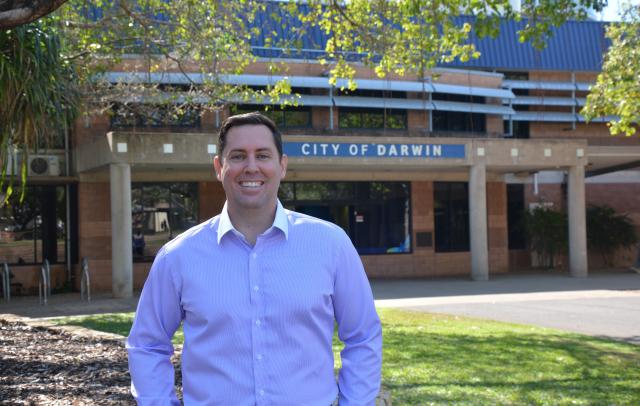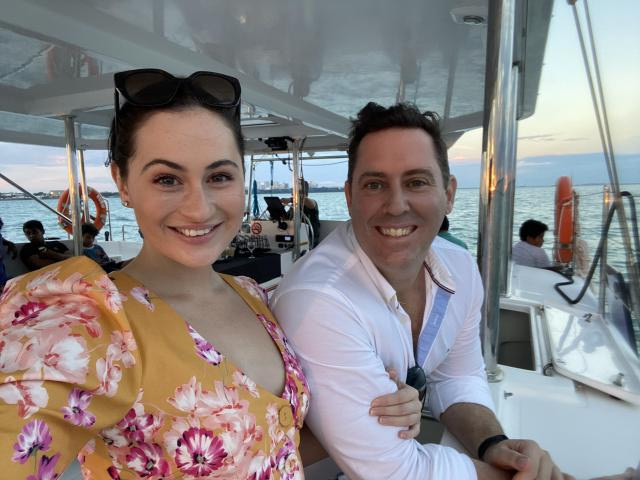PHIL JARRATT talks to new Noosa Council CEO SCOTT WATERS ahead of his arrival to take up the appointment in February.
Congratulations on your appointment. Will you get to have a holiday before you start in Noosa?
I’m having it now. I’ll finish up with Darwin City Council on 20 February and start in Noosa on 22 February.
You’ve only been in the role of Darwin City CEO for three and a half years. Did your departure come as a shock to the team? I understand that Darwin council, like Noosa, has been experiencing a bit of a brain drain at the top level.
I spoke to Lord Mayor Kon Vatskalis about it and with the councillors, and I think they understood that now was very much the right time for me, for a whole range of family reasons, to be heading back to Queensland. Darwin hasn’t had a huge number of high profile departures recently, although our general manager of engineering didn’t renew and our GM of innovation also left to take up a CEO role to further his career.
You started in Darwin on the heels of the Cyclone Marcus disaster and you’ve had to deal with disasters of one kind or another for your entire tenure. Has that been tough?
After Cyclone Marcus I had to really pull the team together. It had been nearly 10 years since Darwin had gone through a cyclone and the team had changed over that period, so it was really down to me, utilising my experience in local government in North Queensland to get the recovery in place. We had some unique challenges to deal with, like more than 10,000 trees that had been planted post Cyclone Tracey more than 40 years ago being taken out. Our structural damage wasn’t too bad but there was a massive, almost unprecedented amount of green waste, and a huge effort had to go into cleaning that up, including making over 200 parks and playgrounds usable again.
Is this what sparked your interest in waste management?
I think I realised that we had to focus on waste and also on climate change, to keep them foremost in the mind of the community. When we released our strategies on these issues they were different from what had gone before in that they weren’t stand-alone local government strategies. We embraced the need for an integrated all of government strategy. That came out of Cyclone Marcus but it’s been at the core of what we’ve done all the way.
Wishing you well in your new job, Lord Mayor Vatskalis was effusive in his praise of you in a number of areas. What are you most proud of from your time in Darwin?
For me it was all about modernising the council. I was brought in to do that, to set in place our strategies and our asset management, to get our finances in order, and to have a strong customer service ethos and a values-based culture within the community. All of that was wrapped up in one of the biggest smart city roll-outs in the country.
Apart from the fact that Noosa only has around a third of the Darwin population, what do you see as the major differences between managing the City of Darwin and the Shire of Noosa?
Well, from my Queensland background, planning and economic development were among my key strengths, but in the Northern Territory planning and development is pretty much a Territory Government responsibility and councils are more of a referral agency, so while there’s that fundamental difference, in many ways the two councils are quite similar – around 400 to 500 staff, revenue around $110 million in Darwin and Noosa sitting around $80 million to $100 million. But for me the biggest difference will be in reclaiming a greater involvement in planning and development, which is something I really enjoy. There are critical parts of that equation that the team in Noosa is looking at right now, like housing affordability.
Tourism figures very highly in your CV with various high-powered roles in that space in Queensland, but in researching your recent history I don’t see any comment on the “CU in the NT” campaign. Did you give that a wide berth?
(Laughs) I fully supported a Lord Mayoral minute to keep that logo out of our municipality. While it may resonate with some people, I think there are many more who find it offensive, and I think there are a range of reasons for distancing from it. We’ve been very involved in our Indigenous community and I think they find it particularly offensive.
So you won’t be promoting something like “CU in Noosa Tomorrow”?
(Laughs) No, that won’t be coming from my end.
On a more serious note but still on tourism, I’m sure you’re aware that Noosa Council has recently been stepping up to a greater role in destination management. Any thoughts on what role you, with a wide range of tourism skill sets, might play in that?
I think it’s one of the most important parts of what a council in a place like Noosa will be doing next, planning a future that delivers for the broad community as well as the tourism operators, having the right product mix that will deliver at the highest level. I know there has been some controversy over moving those responsibilities from Tourism Noosa, but I think it’s really important to have an integrated, all-of-community approach, while acknowledging that tourism is one of the main economic drivers of Noosa.
You’ve touched on what might be the biggest difference between where you are and where you’re coming to. While Darwin and the Territory are huge tourism magnets, in the capital it’s one of several key industries. In Darwin were you more focused on other industries?
We worked very closely with Tourism Top End and Tourism NT, because the biggest issue for Darwin is that, apart from the corporate market, it’s generally somewhere you go to in order to go somewhere else. Our position as a council was to make Darwin about more than rocks and crocs. It’s the perennial tourism question, how do you get people to stay longer. We’ve worked really hard with the tourism industry on a destination management plan that will come out soon focusing on the Larrakia people and the seasons of the Territory – the Seven Seasons, Seven Senses campaign.
As I’m sure you know, your predecessor in Noosa, Brett de Chastel, has a keen interest in First Nations issues and was one of the driving forces in pushing for more involvement of the Kabi Kabi in that industry. Do you have any thoughts on that?
I do, and members of the Kabi Kabi community have already reached out to me. I know Noosa Council is focused on a policy of inclusion and all that embraces, and I’ll be pursuing a close involvement in forming a reconciliation plan that has real outcomes, as I think we’ve done in Darwin. I’ll be discussing my experiences in Darwin in this space with the elected members after I’ve taken office.
You get a big rap in Darwin for your achievements in financial and waste management. Are these areas you’ve looked at for your role in Noosa?
Well, from the financial perspective, I think it’s important that the community can see that their money is being spent wisely, and ideally with at least a small surplus for when things go wrong. I can see that in Noosa, de-amalgamation was hard fought and expensive but eight years on, things are in pretty good shape and looking good for the future. The funds are there and the way I run local government is just like a business, but a community-focused business.
In relation to waste, I’ve had a brief look and the size of the waste problem looks about right for the size of Noosa. But it’s about minimising it, it’s about talking to the community about what we do with green waste, our recyclables and ultimately, the stuff that has to go to landfill. You can’t regard these places as dumps or tips any more. They have to be seen as an important part of infrastructure, with every element being treated the best way it can be. On the back of that, waste to energy is becoming an important element too, and I’ve had some experience in that in Darwin. When I first came into local government people used to say it was about roads, rates and rubbish. Of course it’s become much more than that, but rubbish is an ever-increasing part of the equation, and we have to get it right.
You’ve worked in other Queensland communities where they’ve had a gung ho attitude to development. As you know, Noosa is this little bubble of tranquillity in what Barnaby Joyce calls Supercity SEQ. How do we maintain the bubble with such pressure for growth?
There are a couple of components to that. The first is how we move around the local government area. The second is how we manage urban infill and not have sprawl. There needs to be a new strategy if we’re going to provide affordable housing, for our council staff and essential workers as much as anyone. We have to ensure there’s a mix of housing available. The next stage in this is to start a serious conversation with the community about what they want the Noosa of the future to look like.
Perhaps the key issue you’ve touched on there is that no one wants urban sprawl but in Noosa nor do we want to grow upwards. We like the palm tree height limit. So how do you grow?
And how do you provide the water and the energy as the sprawl grows? That becomes very difficult so you need to create pockets in areas that minimise movement from home to workplace. Look, there are some wicked problems wrapped up in that, stuff that we as a council will have to work through.
There’s one job you took on that doesn’t figure on your CV. You were once in charge of commercial operations for the North Queensland Fury soccer team, which no one remembers. Is that why it’s not there?
I’m really proud of that role. It gave me some sporting background, which I do note in my resume. Trying to get a brand new national sporting franchise off the ground in the middle of the GFC in a non-traditional market was not easy, but we got it up and running, bringing Queensland Nickel on as our major sponsor. The shining moment was signing Liverpool legend Robbie Fowler as our marquee player. The most important lesson was that I realised my career wasn’t always going to be paved in gold. But I still wear the merchandise sometimes (laughs).
Did that role come out of your love of sport?
In a way it did. Prior to that a lot of my career had been spent with Qantas, some of it working overseas. Living in the UK, I soaked up quite a bit about football, so that was useful. But I’ve always loved all kinds of sport. When I hit Noosa I’ll be joining a surf life saving club with my partner Tori, and hitting the beach whenever we can. Trekking around the hinterland is another thing I want to get into. Can’t wait.







